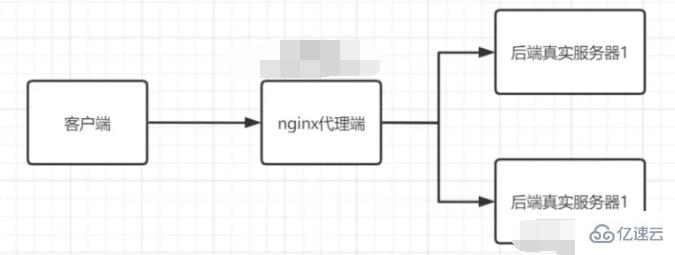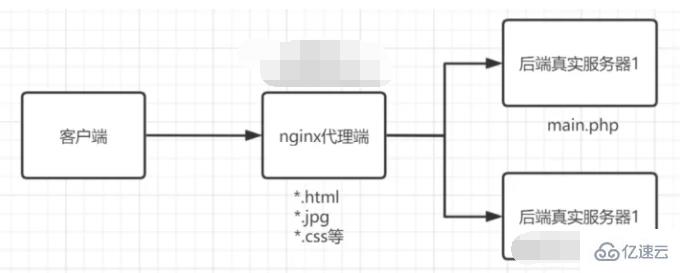What is the concept of linux nginx
linux nginx is a high-performance HTTP and reverse proxy web server, and also provides IMAP/POP3/SMTP services; it is characterized by occupying less memory and strong concurrency capabilities. In fact The concurrency capabilities of nginx perform better among web servers of the same type.
1. What is nginx?
I believe that many friends who are learning Linux or already engaged in operation and maintenance have heard of nginx, so what exactly is it? Why is it so popular?
First of all, nginx is a high-performance web server invented by the Russians. It has the function of a web server like early Apache, IIS, Lighttpd, etc., and can publish website code and other resources to provide users with information. Information. However, the function of nginx is not only as a web server, it can also be used as a reverse proxy and load balancing server, and the overall performance is very powerful. It is currently the first choice for enterprises in the web front-end server.
The foreign site [Netcraft News] counts the web servers used by the most popular websites in the world, among which nginx has always ranked first:

At present, most of our domestic Internet enterprise portals also use nginx, including
<p>阿里巴巴开源镜像站-OPSX镜像站-阿里云开发者社区 developer.aliyun.com/mirror/ 网易开源镜像站 mirrors.163.com/ 清华大学开源软件镜像站 | Tsinghua Open Source Mirror mirrors.tuna.tsinghua.edu.cn </p>
and so on.
2. What can nginx do?
In the following articles, we will detail the major usages of nginx. Here, let’s make a brief introduction:
2.1 nginx can be used as a reverse proxy:
nginx’s reverse proxy is a very important function of nginx, which can hide the backend server’s quantity, and ensure that the back-end server is protected from attacks. The schematic diagram is as follows:

When a user initiates a request to this website, in fact, the user The request is processed by the back-end real server, and the intermediate server is the reverse proxy server.
2.2 nginx can do load balancing:
nginx’s load balancing is actually an extension of the reverse proxy. When a single back-end server cannot handle the huge front-end requests, it can provide multiple back-end services. Prepare several servers to share the traffic. This is load balancing, also called balanced load. The diagram is as follows:

2.3 nginx can do it Domain name redirection:
Redirection is also a very important function of the web server. Let me give you an example: Suppose your company now has a domain name, and many old users are used to using this domain name to access your website. When a company undergoes a transformation and changes its domain name, it may lose many old users. We can solve this problem through nginxd redirection, just redirect the traffic accessing the original domain name to the new domain name. The actual combat of this technology will be demonstrated through examples later.
In addition to domain name redirection, internal redirection can also be performed. For example, when users access non-existent resources, we hope to provide some guidance information or redirect them to the homepage. At this point, you can write the internal redirection implementation.
2.4 nginx can do dynamic and static separation:
Dynamic and static separation is one of the reverse proxy functions of nginx. It is very powerful and special and is usually discussed independently. Because nginx has a very strong ability to handle static resources and is very efficient. So many times, we will directly hand over the static resources requested by the user to the nginx proxy server for processing, and then proxy the dynamic applications to the backend for processing by the application server to improve the user experience. The dynamic and static separation diagram is as follows:

Nginx has many powerful functions, including caching server, mail proxy server and microservice gateway. Anyone who masters Linux or is a practicing operation and maintenance engineer should learn and become proficient in this powerful service application.
The above is the detailed content of What is the concept of linux nginx. For more information, please follow other related articles on the PHP Chinese website!

Hot AI Tools

Undresser.AI Undress
AI-powered app for creating realistic nude photos

AI Clothes Remover
Online AI tool for removing clothes from photos.

Undress AI Tool
Undress images for free

Clothoff.io
AI clothes remover

Video Face Swap
Swap faces in any video effortlessly with our completely free AI face swap tool!

Hot Article

Hot Tools

Notepad++7.3.1
Easy-to-use and free code editor

SublimeText3 Chinese version
Chinese version, very easy to use

Zend Studio 13.0.1
Powerful PHP integrated development environment

Dreamweaver CS6
Visual web development tools

SublimeText3 Mac version
God-level code editing software (SublimeText3)

Hot Topics
 1386
1386
 52
52
 How to check the name of the docker container
Apr 15, 2025 pm 12:21 PM
How to check the name of the docker container
Apr 15, 2025 pm 12:21 PM
You can query the Docker container name by following the steps: List all containers (docker ps). Filter the container list (using the grep command). Gets the container name (located in the "NAMES" column).
 How to start containers by docker
Apr 15, 2025 pm 12:27 PM
How to start containers by docker
Apr 15, 2025 pm 12:27 PM
Docker container startup steps: Pull the container image: Run "docker pull [mirror name]". Create a container: Use "docker create [options] [mirror name] [commands and parameters]". Start the container: Execute "docker start [Container name or ID]". Check container status: Verify that the container is running with "docker ps".
 What computer configuration is required for vscode
Apr 15, 2025 pm 09:48 PM
What computer configuration is required for vscode
Apr 15, 2025 pm 09:48 PM
VS Code system requirements: Operating system: Windows 10 and above, macOS 10.12 and above, Linux distribution processor: minimum 1.6 GHz, recommended 2.0 GHz and above memory: minimum 512 MB, recommended 4 GB and above storage space: minimum 250 MB, recommended 1 GB and above other requirements: stable network connection, Xorg/Wayland (Linux)
 vscode cannot install extension
Apr 15, 2025 pm 07:18 PM
vscode cannot install extension
Apr 15, 2025 pm 07:18 PM
The reasons for the installation of VS Code extensions may be: network instability, insufficient permissions, system compatibility issues, VS Code version is too old, antivirus software or firewall interference. By checking network connections, permissions, log files, updating VS Code, disabling security software, and restarting VS Code or computers, you can gradually troubleshoot and resolve issues.
 What is vscode What is vscode for?
Apr 15, 2025 pm 06:45 PM
What is vscode What is vscode for?
Apr 15, 2025 pm 06:45 PM
VS Code is the full name Visual Studio Code, which is a free and open source cross-platform code editor and development environment developed by Microsoft. It supports a wide range of programming languages and provides syntax highlighting, code automatic completion, code snippets and smart prompts to improve development efficiency. Through a rich extension ecosystem, users can add extensions to specific needs and languages, such as debuggers, code formatting tools, and Git integrations. VS Code also includes an intuitive debugger that helps quickly find and resolve bugs in your code.
 Can vscode be used for mac
Apr 15, 2025 pm 07:36 PM
Can vscode be used for mac
Apr 15, 2025 pm 07:36 PM
VS Code is available on Mac. It has powerful extensions, Git integration, terminal and debugger, and also offers a wealth of setup options. However, for particularly large projects or highly professional development, VS Code may have performance or functional limitations.
 How to switch Chinese mode with vscode
Apr 15, 2025 pm 11:39 PM
How to switch Chinese mode with vscode
Apr 15, 2025 pm 11:39 PM
VS Code To switch Chinese mode: Open the settings interface (Windows/Linux: Ctrl, macOS: Cmd,) Search for "Editor: Language" settings Select "Chinese" in the drop-down menu Save settings and restart VS Code
 What is the main purpose of Linux?
Apr 16, 2025 am 12:19 AM
What is the main purpose of Linux?
Apr 16, 2025 am 12:19 AM
The main uses of Linux include: 1. Server operating system, 2. Embedded system, 3. Desktop operating system, 4. Development and testing environment. Linux excels in these areas, providing stability, security and efficient development tools.




